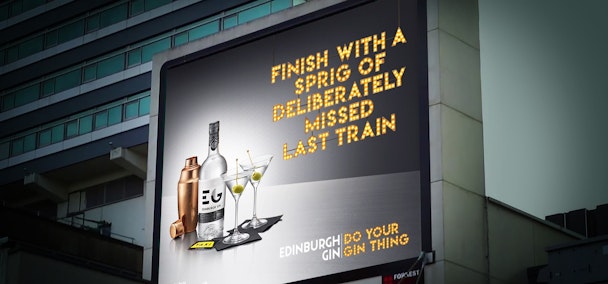Industry resists calls for alcohol ad ban in Scotland
The Advertising Association has joined Scottish agencies in criticizing a campaign to ban alcohol advertising in print, outdoor and point-of-sale.

A billboard campaign for Edinburgh Gin
A new report from Alcohol Focus Scotland and the Alcohol Marketing Expert Network has spelled out the detrimental impact alcohol advertising has on people – particularly those in recovery for addiction.
It found that alcohol adverts can ”encourage consumption and risk-taking behavior amongst heavier drinkers”.
Regulation of TV, radio and online advertising does not fall under the remit of the Scottish government, but it can control advertising in outdoor and public spaces.
Campaigners and MPs are now pushing for a ban on all alcohol advertising on billboards, as well as at football grounds, concert halls and on public transport.
They also want to see a ban on alcohol brands sponsoring sports, events or people, as well as a ban on branded merchandise, competitions, point-of-sale promotions and advertising in print publications.
Minister for public health Maree Todd has said a consultation on restrictions for Scotland will be carried out later this year and that she was determined to tackle the impacts that alcohol marketing can have on children and young people as well as those in recovery.
‘It won’t work’
An ad ban would be a blow for the Scottish advertising sector, which is heavily supported by the hefty marketing spend for brands like Tennent’s, Macallan Whisky and Edinburgh Gin.
Sue Eustace, who is the director of public affairs at the Advertising Association, says the proposed approach was not the best route to solving the complex issues highlighted by the report.
“Scotland has a rich tradition of distilling and brewing, and thousands of artisanal whisky distillers are a key part of Scotland’s rural economy and cultural landscape,” she says. “Responsible advertising is an essential aspect of doing business, especially for smaller distilleries and breweries, and this advertising revenue in turn, funds regional media, sports and arts.
“The causes of alcohol harms are multi-faceted – research has shown that friends, colleagues and family environment have a much more considerable influence on drinking patterns and alcohol-related harm than advertising and marketing. Ban the advertising and you don’t solve the problem.”
Advertising agencies in Scotland have embraced the current rules set by the Advertising Standards Authority, which strictly prohibits advertising to those under 18, including banning ads near schools and other out-of-home spaces where children are likely to congregate. Marketers are also prohibited from portraying irresponsible or immoderate drinking, while any marketing that tries to link alcohol to youth culture is strictly banned.
Katie Hughes is client services director at MadeBrave, an ad agency that counts Diageo, Johnny Walker, William Grant & Sons and Edrington (owner of brands including The Macallan and The Famous Grouse) among its clients. She agrees it is the wrong approach for an industry already heavily regulated.
“Unlike the famous ads of yesteryear, from Stella Artois to Tennent’s, advertising alcohol in 2022 is a very different beast and now one of the most tightly regulated categories in the world of consumer goods – something that we fully support.
“In recent years, owing to the ASA’s quite rightly strict regulations, many alcohol brands have adjusted their strategies to reflect a potentially softer creative approach. MadeBrave, along with the wider industry, is hypersensitive to the issues around alcohol advertising and will continue to apply the rules set by ASA in the way they’re intended.
“However, we don’t feel tightening them further is a requirement. In fact, we apply our own strict social compass to our work in all categories we work in and we don’t find that this hampers creativity either.
“The issue of alcohol advertising will always be a controversial one, but we will always be guided by the ASA – trusting its role in protecting consumers and working with it to ensure our campaigns are legal, decent, honest and responsible.”
The Scottish government has previously introduced other initiatives with varying success. The most significant change has been its minimum pricing for alcohol, which was introduced in 2018 to curb alcohol dependence.
Despite some studies claiming that move had resulted in a lasting, positive impact on drinking behaviors, a subsequent report by Public Health Scotland found there had been no clear evidence of a change in consumption or severity of dependence.

